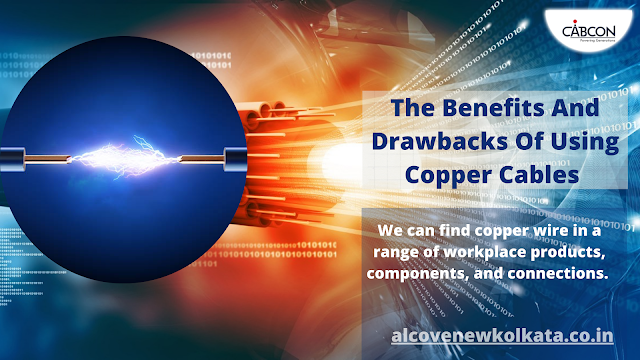We can find copper wire in a range of workplace products, components, and connections. It has long been utilised and trusted to deliver outstanding outcomes. However, as technology advances, new competitors, such as fibre optics, have joined the market. So, in today's blog post, we'll look at the advantages and disadvantages of copper wire. Our goal is to assist you in determining whether this is the best route and option for you. Let's start with the advantages of copper wire for network connectivity:
1. Conductivity: Copper is one of the most electrically conductive materials accessible. In the world of metals, it is only second to silver. It's no wonder that it's frequently found in and around gear that requires a stable electrical connection. They can utilise it with less insulation and armouring than other choices, allowing you to be more flexible with your setup.
2. Heat Resistivity: Copper wire's heat resistance is another significant advantage. It is a good heat conductor and can be utilised in appliances that require corrosion resistance. It also has a high melting point, making it durable.
3. Protection Against Corrosion: Copper has a modest level of reactivity. As a result, it has strong corrosion resistance, lowering the chances of degradation and failure. This ensures a strong link and long-term stability for connection. It also reduces the need for costly and repeated replacements in budget-conscious workplaces.
4. Malleable: The capacity of a material to be moulded into the required shape without breaking is known as malleability. Copper has high malleability. This prevents it from cracking when pounded or rolled into sheets or bent in any direction. The thick wires can be wrapped around corners or shaped to fit the area perfectly in electrical installations.
5. Ductile: The ability of a material to tolerate high tensile stress is known as ductility. Any force that pulls two ends of material apart is referred to as this. Copper wires are created by stretching the material into a thin wire. These wires must also keep their strength without becoming brittle for professional use.
These were some advantages of using copper cables, now let’s have a look at some disadvantages of it:
1. Bad For Electrical Surges: Copper wires can handle very precise electrical charges. When utilised in automobile parts or semi-conductors, for example. They lack the stability required to reduce electrical surges and, as a result, damage.
2. Electromagnetic Interference: When the copper wire is used for electrical purposes, it creates a 'field of interference.' This can interfere, compromise the safety, and make a connection unstable. Many people choose fibre optical cables, which function with light rather than electricity, in environments with a lot of wiring.
3. They Are Expensive: This may surprise many people; fibre optic cables appear to be considerably more expensive. Copper is more expensive to get since it relies on a Latin American foreign commerce system. Similarly, it does not transfer data as far or as swiftly as fibre optics. This means that copper cable is not cost-effective over extended distances where it is required. It takes a lot of cables to accomplish what a fibre optic cable might do with much less.
4. They Can Corrode: You've probably seen old, green, and filthy pennies. This is the reaction that oxygen and other elements have on copper. Copper is highly susceptible to corrosion. There's no way to avoid it, and no matter how well you look after your cables, the copper will eventually succumb to wear and tear. Fibre cable will never corrode, saving you money in the long run.
5. They Can Be Dangerous: Copper cables are a fire and shock threat since they use electricity to transport data. Mishandling these cables can do more than just damage the cables; it can also cause you harm through shock or fire. When not properly maintained, the risk of fire increases dramatically. Fibre optic cables use light to carry data and hence cannot cause a fire. They take greater attention, but they will never endanger your life when handled.
These were some advantages and disadvantages of using copper cables. If you want to purchase good quality aluminium wires, fibre cables or any type of wires, check out Cabcon India. It is one of the most successful aluminium wire rod manufacturers in India. Visit their website at www.cabconindia.com and learn more about their products and services!

Comments
Post a Comment